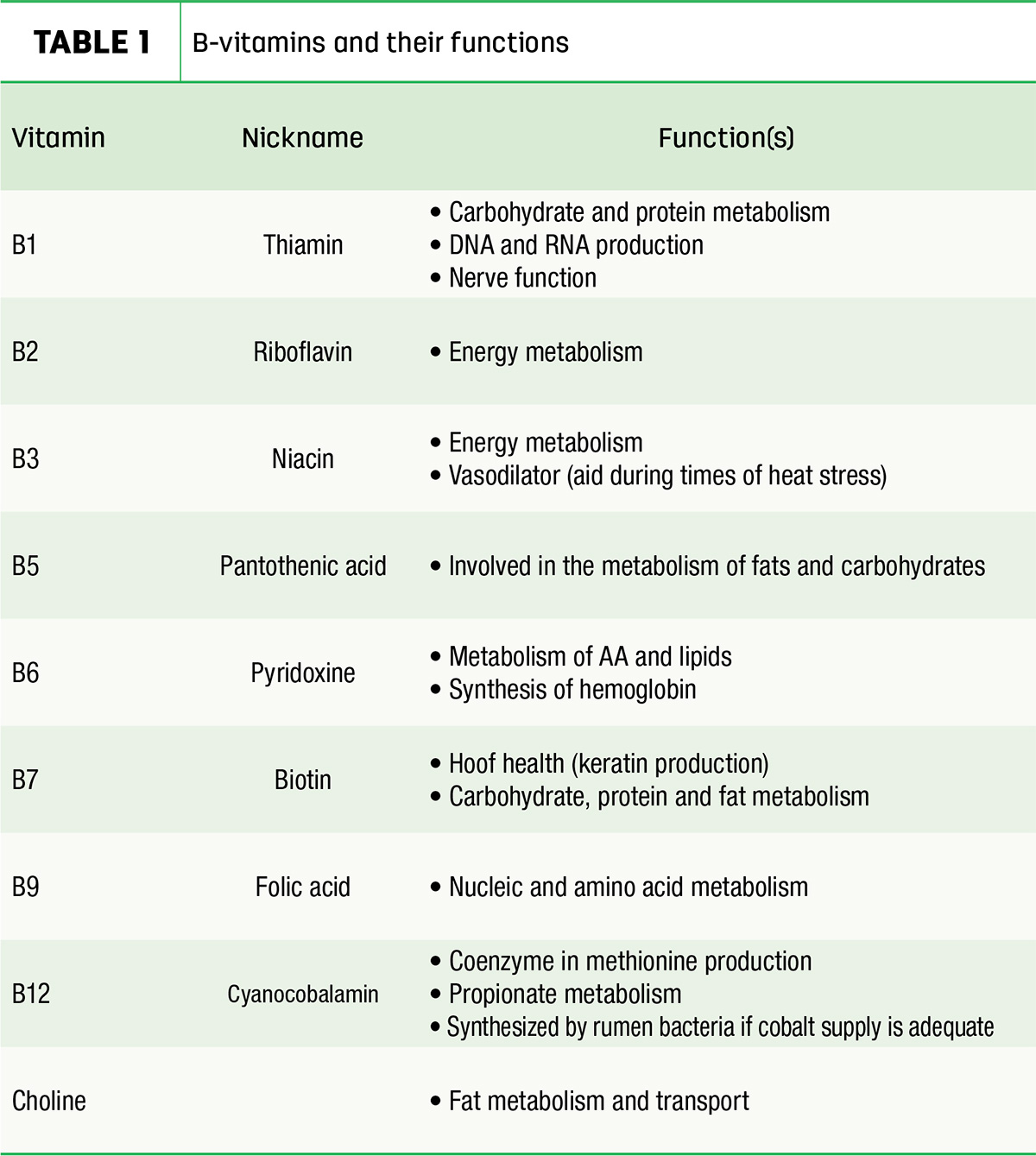The fat-soluble vitamins A, D and E often get a lot of attention when it comes to dairy nutrition, but B vitamins play essential roles in the cow as well and are often overlooked. The B vitamins are a group of water-soluble vitamins that have key functions as enzymatic cofactors or intermediate components in major metabolic reactions (Table 1).

In the past, B vitamins were not commonly supplemented to dairy cows because it was believed that rumen bacterial synthesis of these vitamins was sufficient enough to meet the cow’s needs. However, with today’s high-producing dairy cows and therefore greater nutrient requirements, the necessity of additional B vitamins at the feedbunk is being re-evaluated.
Even the most logical ration changes can result in marked fluctuations in the rumen environment. The microbial population can degrade dietary components differently depending on the nature of the ration, and slight deficiencies may give rise to imperceptible biochemical and cellular dysfunctions without display of obvious clinical signs. Given this, it is often asked if nutritionists should provide additional B vitamins in the diets of dairy cows to overcome the fluctuation in rumen supply.
You will notice from Table 1 that many of these B vitamins play a role in energy metabolism. More specifically, pantothenic acid, biotin, vitamin B12, riboflavin and niacin are all necessary for the conversion of propionate to glucose in the liver. Research in lactating and transition cows has found that a number of B vitamins are insufficient in supply. The rumen microflora has the ability to degrade but also synthesize B vitamins that can later be metabolized in the small intestine.
Some of these B vitamins have a rapid degradation in the rumen. Riboflavin and choline in particular have a 99% ruminal disappearance rate, whereas biotin is only about 60%. Because B vitamins are destroyed easily in the rumen, suggested ways to deliver them to the animal are injection or in the diet via a rumen-protected form (most common).
One B vitamin that is often supplemented in the diet is biotin. Biotin is commonly used to improve hoof health and integrity. Hoof health can be improved with biotin by reducing heel warts, white line separations and sole ulcers, for example. Several studies have reported an increase in milk production when biotin was supplemented at a rate of 15 to 20 milligrams per day. More recently, a 2019 meta-analysis involving nine trials with 1,923 dairy cows evaluated unprotected biotin versus a protected B vitamin blend (containing folic acid, B12, pyridoxine, pantothenic acid and biotin) and showed that the protected blend significantly increased milk yield and milkfat and protein yields. When supplementing biotin as a means to improve hoof health and integrity, it is important to remember the hoof grows at a rate of approximately 2 inches a year, so it may take some time to see noticeable improvement until the hoof has gone through an entire growth cycle.
Another B vitamin receiving a lot of attention lately is niacin. Although a requirement for niacin has not been established, its integral role in energy metabolism suggests that it is important for milk production. In 2005, a meta-analysis was done of 27 studies that fed unprotected niacin at the 12-gram level and reported modest improvements in milk, fat, protein and feed efficiency.
More recent work has focused on rumen-protected niacin and its effects on lipolysis and vasodilation. Several investigations found that just 3.5 grams of rumen-protected niacin resulted in increased dry matter intake (DMI) and a reduction in ketosis, yet did not impact milk components or milk yield. Niacin also has the potential to lower body temperature and increase sweating rate during times of elevated temperatures due to its role as a vasodilator, but results have been highly variable in controlled studies.
Choline is one of the more important B vitamins in practical dairy nutrition today. It is often regarded as a quasi-B vitamin because it does not fit the typical description of a vitamin. Choline can also be made from methionine, so if your diet is below recommended methionine levels, additional choline may not be required. Because the rumen degrades choline, it must be provided in a protected form in order to reap these benefits. Rumen-protected choline has been utilized to help prevent the development of conditions such as fatty liver. It does this by helping transport fatty acids out of the liver and has practical implications for prepartum cows struggling with excess condition.
Typically, choline is fed to transition cows, although some research has shown a carryover effect through lactation of higher milk overall. In 2020, 20 research studies were evaluated in a meta-analysis and reported the supplementation of approximately 13 grams of rumen-protected choline increased milk yields (3.3 pounds per day), DMI (1.1 pounds per day) and improved milkfat and protein.
The interest in B vitamin supplementation to dairy cows is increasing, and there will likely be a new breadth of data on B vitamins in the coming years. A discussion with your nutritionist can help determine if utilizing these B vitamins is necessary to maximize the performance of your dairy herd.
References omitted but are available upon request. Click here to email an editor.






